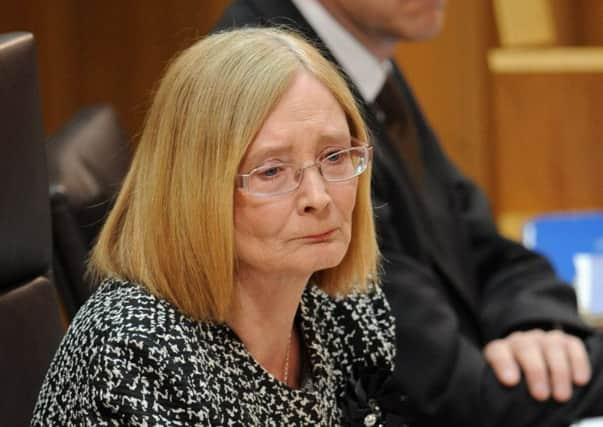Andrew Whitaker: Will SNP cede Presiding Officer role to Labour?


So firm is the SNP’s grip on Holyrood and the Scottish state that most people now simply accept its dominance as a fact of political life.
Should the SNP win an anticipated third term and a second overall majority on 5 May, talk of a one-party state will be even more common currency.
Advertisement
Hide AdAdvertisement
Hide AdWith a raft of tax and welfare powers coming to Holyrood after the election, the next Scottish Government will be more powerful than any of its predecessors of the devolution years.
There is already concern among some opposition MSPs, particularly on the Labour side, that the SNP will press home its advantage still further in this new era of bulked-up powers for the parliament in Edinburgh.
The SNP did not exactly shrink from criticism after its landslide win in 2011, when the party appeared to use its parliamentary muscle to ensure that Tricia Marwick, who was returned on a Nationalist ticket in that year’s election, took the Presiding Officer role.
One influential SNP figure at Holyrood remarked to a journalist on the day Marwick stated her interest in being the parliament’s fourth Presiding Officer that her closest rival for the post, Labour’s Hugh Henry, was simply “not getting” the job of bossing parliamentary proceedings.
Despite Labour’s once dominant position in the Scottish Parliament, an MSP elected on the party’s ticket has never taken the Presiding Officer’s role, with those to have held it being former Liberal leader David Steel, George Reid who had been a Nationalist MSP and MP, Tory politician Alex Fergusson and now Marwick, of the SNP until her appointment.
Even accounting for the dire state of the polls for Labour and it not being clear who will be back for the party in the next parliament, most of its politicians are under no illusions about the chances of the next Presiding Officer coming from their party.
Whether the SNP simply uses its majority to ensure someone elected as one of its own becomes the third Nationalist to take over as Presiding Officer, or opts for someone viewed as a fairly pliable Tory or Liberal Democrat, remains to be seen.
But there has been speculation that a figure like the affable former parliamentary business minister Bruce Crawford, Alex Salmond’s “Mr Fixit” in the days of minority Nationalist government, may succeed Marwick.
Advertisement
Hide AdAdvertisement
Hide AdSome Labour politicians are uneasy about assorted rulings from Marwick, but feel that to kick up a fuss at the fag end of the parliament would do their party more harm than good.
However, there was unhappiness among Labour MSPs about what some claimed was the Presiding Officer ruling out of order opposition amendments to John Swinney’s budget last week. In fairness Marwick has fared well in the post of Presiding Officer, and has a businesslike but friendly style that means she’s deservedly popular, as well as giving her a claim to be one of the best holders of the post since its creation in 1999.
Like all previous Holyrood Presiding Officers, Marwick resigned from the party on whose platform she was elected and it would be wrong to suggest it has been a straightforward case of an SNP supporter showing bias towards her own side.
However, there are some areas where Labour MSPs may have a case of sorts.
Marwick’s decision to exclude Labour MSP James Kelly from the parliament for the best part of two days just before Christmas seemed to many to be heavy handed or at least avoidable.
Kelly was ordered to leave the Holyrood chamber after he refused to take his seat when challenging Marwick over her ruling that Holyrood did not have the power to block David Cameron’s controversial Trade Union Bill.
While Kelly did not exactly try hard not to get excluded, it appeared he was barely given a chance to state his position that more needed to be done to look at how Holyrood could challenge the bill, which will restrict industrial action, on the grounds that it infringed on devolved matters.
Last month Labour MSP Neil Findlay also received a letter from Marwick warning him he would be reported to the standards committee if there was a repeat of an incident when he was heard referring to Nicola Sturgeon as “a liar” in the Holyrood chamber.
Advertisement
Hide AdAdvertisement
Hide AdWhile it would have been better if Findlay had not made such a remark, there will be those who feel that to issue the MSP with what is in affect a disciplinary warning was excessive.
Another Labour MSP, Michael McMahon, was also banned from the Holyrood chamber for a day after ill-advisedly yelling “you’re out of order” in response to a ruling by Marwick in late 2012, a move that was linked to a row about claims Alex Salmond had overstated the number of green energy jobs in Scotland to MSPs.
There is also a feeling among some opposition MSPs that Marwick, despite regularly stating that First Minister’s questions is too dominated by the party leaders, has failed to act to force either Salmond or Sturgeon’s governments to alter this. Other concerns are that Marwick goes too far in controlling which MSPs’ questions are taken at First Minister’s question time, to the point of even taking charge of the running order during her absence, it has been suggested.
Such criticism is arguably harsh, as Marwick, as a former SNP MSP, was always going to face accusations of showing favouritism towards the Nationalists at a time of such dominance by first Salmond and now Sturgeon.
But whatever the weaknesses of Labour’s position and the comparable strength of the SNP after May’s election, surely the Nationalist leadership could take the view that its grip on Scottish politics would not be loosened too much by taking a more relaxed approach to who becomes the next Presiding Officer.